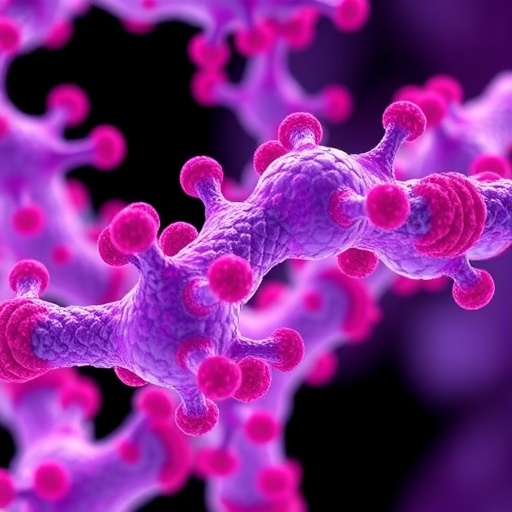
Lactylation-Mediated miRNA Regulation: A Novel Frontier in Cancer Therapy Resistance
In the ever-evolving landscape of cancer therapy, researchers continuously seek innovative pathways and strategies to overcome the ominous challenge of therapy resistance. Among the most critical revelations of recent studies is the role of lactylation in the regulation of microRNAs (miRNAs), illuminating a previously underestimated regulatory mechanism that could revolutionize our understanding of therapeutic responses in cancer patients. In their groundbreaking study, Shou et al. delve into the intricate world of lactylation and its implications for cancer therapy, providing insights that could pave the way for novel intervention strategies.
Lactylation, a post-translational modification characterized by the addition of a lactate moiety to target proteins, has garnered attention for its potential role in cellular signaling. This modification stems from the metabolic byproduct of glycolysis, linking cellular metabolism to gene expression and regulatory mechanisms. Shou and colleagues unveil how lactylation can influence miRNA activity, an area that has gone largely unexplored in the context of cancer therapy resistance. This connection suggests a complex interplay between metabolic pathways and the regulatory networks governing cancer progression and treatment responsiveness.
In their research, the authors first investigate the biochemical mechanisms underlying lactylation and its ability to modify specific miRNAs that have been implicated in cancer therapy. Through precise experimental manipulations, they demonstrate how lactate levels influence miRNA expression patterns, subsequently affecting the cellular responses to anti-cancer treatments. This finding highlights a crucial link between metabolic states and therapeutic efficacy, suggesting that cancer cells may adapt to treatment by altering their miRNA profiles through lactylation.
Furthermore, the study identifies specific miRNAs that are significantly regulated by lactylation. Among these are miRNAs that play pivotal roles in various tumorigenic processes, such as proliferation, apoptosis, and metastatic potential. By targeting these miRNAs, either through direct modification or utilizing novel therapeutic approaches, researchers can potentially enhance the effectiveness of existing therapies. This line of inquiry positions lactylation as a key player in the adaptive responses of cancer cells, rendering them more resilient against conventional treatments.
In their quest for understanding, Shou et al. also explore the broader implications of lactylation on the tumor microenvironment. Cancer cells exist in a highly dynamic and heterogeneous environment, where various factors including nutrient availability, pH, and metabolic state can profoundly influence their behavior. The authors propose that lactate signaling, facilitated by lactylation, could alter the interaction between cancer cells and their surrounding stroma. This alteration might contribute to an ecosystem that promotes therapy resistance, highlighting the need for a holistic approach in cancer treatment that considers both cancer cell metabolism and the microenvironment.
Moreover, the researchers underscore the potential of lactylation as a therapeutic target. By employing small molecules or biological agents that inhibit lactylation pathways, they have demonstrated the feasibility of manipulating miRNA expression levels in preclinical models. Such interventions could disrupt the ability of cancer cells to adapt to therapy, ultimately improving patient outcomes. This approach could represent a paradigm shift in how we understand and combat cancer resistance mechanisms, moving beyond traditional ideas that focus solely on the cancer cell itself.
The implications of this research extend to the realm of personalized medicine as well. Understanding how individual patients metabolically respond to treatments and how lactylation affects their unique miRNA profiles can inform the development of tailored treatment plans. This personalized approach not only holds promise for improving therapeutic efficacy but also for mitigating adverse effects associated with systemic treatments. By integrating lactylation and miRNA regulation into patient care strategies, oncologists could optimize therapy for each individual based on their metabolic state.
In considering the clinical translations of these findings, Shou et al. stress the importance of further investigations to validate their observations in clinical settings. Clinical trials that examine the relationship between lactylation status, miRNA profiles, and treatment responses could provide a wealth of data that shapes future therapeutic protocols. Such endeavors will necessitate multidisciplinary collaboration among oncologists, biochemists, and molecular biologists to foster a deeper understanding of this complex interplay.
As researchers continually unlock the intricate mechanisms of cancer therapy resistance, the role of lactylation emerges as an exciting new frontier. The study by Shou and colleagues serves as a pivotal entry point into this realm, setting the stage for future investigations that could transform the landscape of cancer treatment. By understanding and leveraging the lactylation-mediated regulation of miRNAs, researchers may uncover novel strategies to outsmart cancer and thwart its insidious ability to resist therapy.
While the path toward translating these findings into clinical practice remains fraught with challenges, the potential rewards are immense. As scientists unearth the connections between metabolism, epigenetics, and gene regulation, the hope is that these insights will culminate in more effective, less toxic cancer therapies. The journey of understanding lactylation’s influence on miRNA regulation, as delineated by Shou et al., represents a significant step forward in the ongoing battle against cancer, a battle that continuously demands innovative approaches and fresh perspectives.
The ongoing exploration of lactylation as a regulator in cancer therapy could lead not only to improved treatment regimens but also to a deeper understanding of cancer biology. As this research unfolds, the scientific community remains hopeful that these insights will not only advance our knowledge of cancer mechanisms but also empower clinicians to provide better, more effective care for patients facing this formidable disease.
In conclusion, the work of Shou et al. underscores the importance of exploring novel post-translational modifications like lactylation in the quest to unravel the complexities of cancer therapy resistance. As we stand on the cusp of new discoveries, the merging of biochemistry, molecular biology, and clinical research opens up a myriad of possibilities to combat one of humanity’s most daunting challenges. The journey is far from over, but with each step forward, we come closer to turning the tide against cancer.
Subject of Research: Lactylation-mediated miRNA regulation in cancer therapy resistance.
Article Title: Lactylation-mediated miRNA regulation in cancer therapy resistance.
Article References:
Shou, Y., Liu, R., Xiong, H. et al. Lactylation-mediated miRNA regulation in cancer therapy resistance.
J Transl Med 23, 941 (2025). https://doi.org/10.1186/s12967-025-06959-5
Image Credits: AI Generated
DOI: https://doi.org/10.1186/s12967-025-06959-5
Keywords: Lactylation, miRNA, cancer therapy resistance, post-translational modifications, cancer biology, metabolism, personalized medicine.
Tags: cancer therapy resistance mechanismscellular signaling in cancer therapyglycolysis and cancer progressioninnovative cancer research insightslactylation in cancer therapylactylation-mediated miRNA regulationmetabolic pathways in cancermiRNA activity in cancer treatmentnovel cancer intervention strategiespost-translational modification in oncologyregulation of gene expression in cancertherapeutic responses in cancer patients




